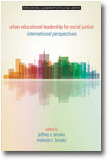
Urban Educational Leadership for Social Justice
International Perspectives
Edited by:
Jeffrey S. Brooks, Curtin University
Melanie C. Brooks, Edith Cowan University
A volume in the series: Educational Leadership for Social Justice. Editor(s): Jeffrey S. Brooks, Curtin University. Denise E. Armstrong, Brock University. Ira Bogotch, Florida Atlantic University. Sandra Harris, Lamar University. Whitney Sherman Newcomb, Virginia Commonwealth University. George Theoharis, Syracuse University.
Published 2015
The chapters in Urban Educational Leadership for Social Justice: International Perspectives constitute a collection of works that explore dynamics related to equity in multiple contexts. Authors examined these issues in Turkey, Egypt the United States, Thailand and at a global level by comparing and contrasting school leadership practice across borders. Considered as a whole, these papers explore various topics that will be at the forefront of educational research for years to come. Increasingly, educational leadership understand that there are important lessons to be learned internationally and globally. This book includes important research conceived from these perspectives. Our hope is that individually and collectively, they might contribute to our understanding of international and global issues in educational leadership and that they will extend, challenge and deepen extant lines of inquiry and begin others.
CONTENTS
Series Editor’s Preface, Jeffrey S. Brooks. Introduction and Acknowledgement, Jeffrey S. Brooks and Melanie C. Brooks. Designing Democratic Community, Lisa A. W. Kensler. The Impact of No Child Left Behind on the Achievement Gap: A Decade View of Hampton Roads Area School Districts in Virginia, Whitney Sherman Newcomb and Kerry Robinson. Widening Participation in Higher Education in England: The Significance of Educational Leadership, Michael F Watts. Sustaining Social Justice: Strategies Urban Principals Develop to Advance Justice and Equity While Facing Resistance, George Theoharis. Effective Leadership in a Culturally Diverse Learning Environment, Tim Grothaus, Karen S. Crum, and Anita B. James. The Components of an Effective Mentoring Program From Turkish School Leaders’ Perspective, Adem Bayar. Segregation and Poverty: Impacts on Reading Achievement and Leadership Implications, Jennifer Clayton, Karen Sanzo, and Angela Rhett. Leadership of Thai Public School Secondary Principals in an Era of Education Reform and Cultural Unrest, Ekkarin Sungtong, Margaret Grogan, and Brendan Maxcy. Unpacking Replicative and Transformative Approaches to Social Justice in Canada and the United States: Administrators’ Perspectives, Brenda J. McMahon and Denise Armstrong. Sowing Seeds of Oppression for African American Education: Destiny or Design? Curtis Williams and Jeffrey S. Brooks. Revisiting Distributed Leadership: Examining the Risks of “Democratic” Participation for an Immigrant and Refugee Community, Thu Suong Thi Nguyen and Brendan D. Maxcy. Teaching in Cairo: Exploring Gender, Social Class, and Workplace Relationships, Melanie C. Brooks. Relational Leadership, Social Justice, and Spirituality Among Female Secondary School Leaders in Urban and Suburban Contexts, Gaëtane Jean-Marie and Anthony H. Normore. Cracking the Code: Illuminating the Promises and Pitfalls of Social Justice in Educational Leadership, Floyd D. Beachum and Carlos R. McCray.
-
Paperback978-1-68123-176-1
Web price: $45.04 (Reg. 52.99)
-
Hardcover978-1-68123-177-8
Web price: $80.74 (Reg. 94.99)
- eBook978-1-68123-178-5

-
 Adult Intentions, Student Perceptions
How Restorative Justice is Used in Schools to Control and to Engage
Adult Intentions, Student Perceptions
How Restorative Justice is Used in Schools to Control and to Engage
-
 Crossing the Bridge of the Digital Divide
A Walk with Global Leaders
Crossing the Bridge of the Digital Divide
A Walk with Global Leaders
-
 Dear Gay, Lesbian, Bisexual, And Transgender Teacher
Letters Of Advice To Help You Find Your Way
Dear Gay, Lesbian, Bisexual, And Transgender Teacher
Letters Of Advice To Help You Find Your Way
-
 Envisioning a Critical Race Praxis in K-12 Education Through Counter-Storytelling
Envisioning a Critical Race Praxis in K-12 Education Through Counter-Storytelling
-
 Restorative Practice Meets Social Justice
Un-Silencing the Voices of "At-Promise" Student Populations
Restorative Practice Meets Social Justice
Un-Silencing the Voices of "At-Promise" Student Populations
-
 School Leadership in a Diverse Society
Helping Schools Prepare all Students for Success (2nd Edition)
School Leadership in a Diverse Society
Helping Schools Prepare all Students for Success (2nd Edition)
-
 Within Reach
Providing Universal Access to the Four Pillars of Literacy
Within Reach
Providing Universal Access to the Four Pillars of Literacy

